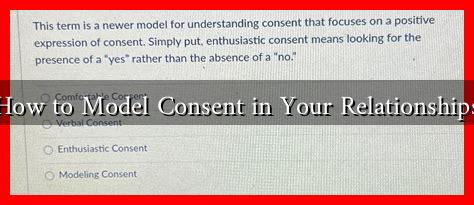-
Table of Contents
How to Model Consent in Your Relationships
Consent is a fundamental aspect of any healthy relationship, whether romantic, platonic, or professional. It is the cornerstone of mutual respect and understanding, ensuring that all parties feel safe and valued. However, many people struggle with the concept of consent, often viewing it as a mere formality rather than an ongoing dialogue. This article will explore how to model consent in your relationships, providing practical tips and insights to foster a culture of respect and communication.
Understanding Consent
Before diving into how to model consent, it’s essential to understand what consent truly means. Consent is an agreement between participants to engage in a specific activity. It is:
- Informed: All parties should have a clear understanding of what they are consenting to.
- Freely Given: Consent must be given without coercion, manipulation, or pressure.
- Revocable: Anyone can withdraw consent at any time, and this decision must be respected.
- Enthusiastic: Consent should be given with eagerness and willingness, not out of obligation.
Communicating Openly
Effective communication is the bedrock of modeling consent in any relationship. Here are some strategies to enhance communication:
- Ask Questions: Encourage open dialogue by asking your partner how they feel about certain activities. For example, “How do you feel about trying this?”
- Share Your Feelings: Be open about your own desires and boundaries. This transparency fosters trust.
- Use “I” Statements: Frame your thoughts from your perspective to avoid sounding accusatory. For instance, “I feel uncomfortable when…” instead of “You make me uncomfortable when…”
Setting Boundaries
Boundaries are crucial in any relationship, and they play a significant role in consent. Here’s how to establish and respect boundaries:
- Define Your Boundaries: Take time to reflect on what you are comfortable with and communicate these boundaries clearly.
- Respect Others’ Boundaries: Always listen and respect the boundaries set by others, even if they differ from your own.
- Check-In Regularly: Relationships evolve, and so do boundaries. Regularly check in with your partner to ensure that everyone feels comfortable.
Modeling Consent in Different Contexts
Consent is not limited to physical intimacy; it applies to various aspects of relationships. Here are some examples:
- Emotional Consent: Before sharing personal feelings or experiences, ask if the other person is in a space to listen. For example, “Is this a good time for you to talk about something personal?”
- Digital Consent: In the age of social media, it’s essential to seek permission before sharing photos or information about someone online.
- Social Activities: Always check if your partner is comfortable with plans or activities, especially if they involve new experiences.
Case Studies and Statistics
Research shows that clear communication about consent can significantly reduce instances of misunderstanding and conflict in relationships. According to a study published in the Journal of Interpersonal Violence, couples who engage in open discussions about consent report higher levels of satisfaction and trust. Furthermore, a survey by the Rape, Abuse & Incest National Network (RAINN) found that 63% of individuals who experienced sexual violence reported that they did not feel comfortable expressing their lack of consent. This highlights the importance of fostering an environment where consent can be freely discussed.
Conclusion
Modeling consent in your relationships is not just about obtaining permission; it’s about creating a culture of respect, understanding, and open communication. By understanding the principles of consent, communicating openly, setting and respecting boundaries, and applying these concepts across various contexts, you can foster healthier and more fulfilling relationships. Remember, consent is an ongoing conversation, and it is essential to check in regularly with your partner to ensure that both parties feel safe and valued. By prioritizing consent, you contribute to a more respectful and empathetic society.

